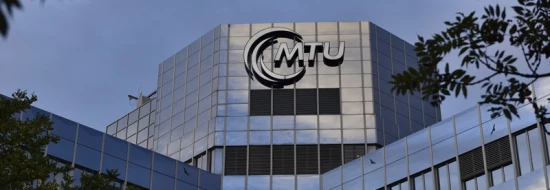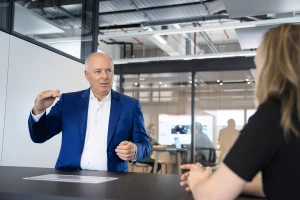aviation
Special MRO services in demand at aviation hotspot Dubai
Forever on the go, the MRO experts at MTU Maintenance in Dubai provide MTU customers with perfectly tailored service solutions—in a region with extreme climate conditions.
author: Nicole Geffert | 7 mins reading time published on: 09.11.2021
author:
Nicole Geffert
has been working as a freelance journalist covering topics such as research and science, money and taxes, and education and careers since 1999.
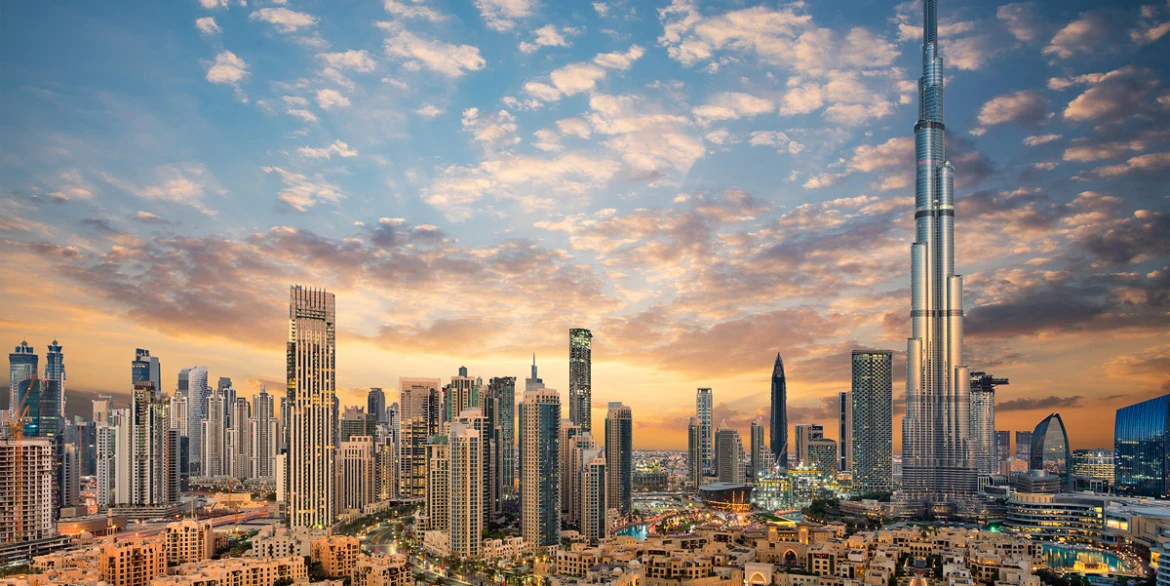
Things are looking up. The number of takeoffs and landings at Dubai International Airport is noticeably on the rise. This trend can be observed quite clearly from the window of the office of MTU Maintenance in Dubai, which is situated right next to the airport. Not that Fahmy Khan and Wolfgang Neumann have much time to enjoy the view. The two MTU Maintenance sales experts for the Middle East region are always busy looking after customers. Now that aviation is bouncing back, their schedules are fuller than ever.
“Dubai is an outstanding location to establish and strengthen MTU's customer relationships in the Middle East and beyond.”
Vice President Marketing and Sales at MTU Maintenance for the Middle East and Southeast Asia regions
“Dubai is an outstanding location to establish and strengthen MTU's customer relationships in the Middle East and beyond,” says Sami Ben-Kraiem, Vice President Marketing and Sales at MTU Maintenance for the Middle East and Southeast Asia regions. MTU opened its office in Dubai at the end of 2019 to be even closer to customers. Since then, the company has been able to respond more flexibly to the needs of its maintenance customers and lessees in this region and provide them with even better and faster support through perfectly tailored service solutions.
“The Middle East is a market in which trust and relationships play a very special role. We’ve got more than 20 customers here and we want to be a reliable partner to each and every one,” says Khan. He knows the aviation market in the Middle East inside out and actually helped set up the office in Dubai. “MTU has established itself here as a company and brand and has earned an excellent reputation.”
The starting conditions were ideal, and it wasn’t long before suitable premises were found. Dubai has direct connections to almost every city in the region, as well as the nearby Indian subcontinent, and the MTU office is located right next to Terminal 2 at the airport. Short distances and customer proximity are top priorities at MTU Maintenance.
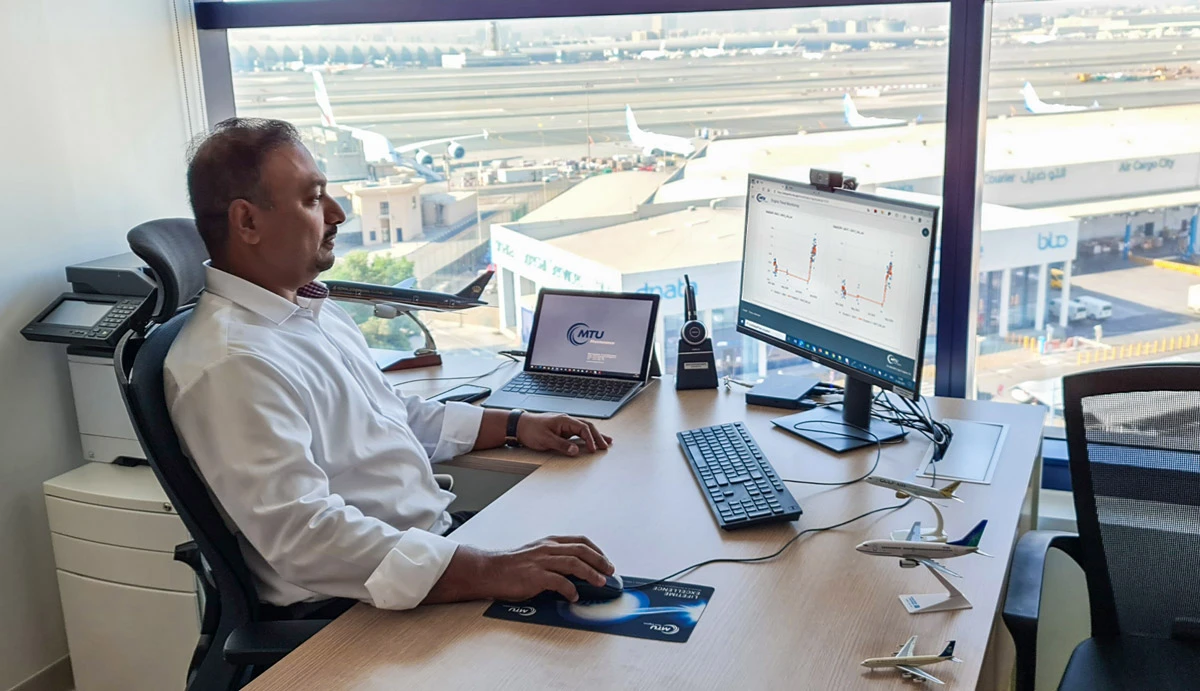
Working with a view: The MTU Maintenance office is located right next to Terminal 2 at Dubai International Airport. Fahmy Khan has an excellent view of takeoffs and landings from there.
“It’s important for us to continue to be a reliable partner for our customers in these challenging times, and to support them by providing innovative solutions that meet their maintenance needs.”
Sales expert at MTU Maintenance in Dubai
A market that is coming back strong
All major players in the aviation industry—including airlines, aircraft manufacturers, and OEMs—are present in Dubai, making it a great place for networking. “Not even the coronavirus pandemic could stop us,” says Khan. On the contrary, MTU Maintenance has expanded its workforce in Dubai. For over a year, Wolfgang Neumann has been working side by side with Fahmy Khan. Like his colleague, he looks after MTU customers in the Middle East, but he also takes care of customers in the Pacific region. The sales expert has spent the past 20 years working all over the world. “Up to the pandemic, the Middle East was a market with strong growth, and Dubai was an important hub for flights between, say, Europe and Asia, Australia or New Zealand,” he explains. “We’re convinced that the market is coming back strong.”
“MTU finds efficient solutions without customers having to compromise on quality. This goes for repair services as well as for alternatives that we can offer our customers, such as engine leasing.”
Sales expert at MTU Maintenance in Dubai
Although the majority of customers are still clearly feeling the effects of the pandemic, aircraft are gradually returning from their parking spots to the runways. “It’s important for us to continue to be a reliable partner for our customers in these challenging times, and to support them by providing innovative solutions that meet their maintenance needs,” Neumann says. “And MTU finds efficient solutions without customers having to compromise on quality. This goes for repair services as well as for alternatives that we can offer our customers, such as engine leasing,” Khan says.
Engine leasing is taking off
Ben-Kraiem recalls that ten years ago, aircraft fleets and replacement engines in this region were generally owned by the airlines. Now, leasing is much more common. “MTU is ideally placed to meet the needs of our customers for leasing and replacement engines. MTU Maintenance Lease Services specializes in engine leasing, particularly when it comes to short- and medium-term leasing,” he explains.
Not all lessors lease engines in this region, because components wear faster due to the predominating climate conditions. “Consequently, MTU Maintenance has developed tailored solutions for its customers there, which also factor in short leasing periods,” says Ben-Kraiem. On top of the necessary leasing know-how, MTU Maintenance knows everything there is to know about looking after engines from both a technical and commercial perspective. This technical asset management is popular among customers in the Middle East.
“MTU Maintenance’s fleet management is also in greater demand than ever. It allows us to offer our customers cost-effective and flexible solutions for fleet operations—a big advantage not only during the pandemic, but also now as things pick up and there are more flights again,” Ben-Kraiem says. In addition, there is the experience and know-how of the MRO experts when it comes to repairs and maintenance. More than 20,000 shop visits speaks for itself, as does MTU’s broad engine portfolio of over 30 engine types.
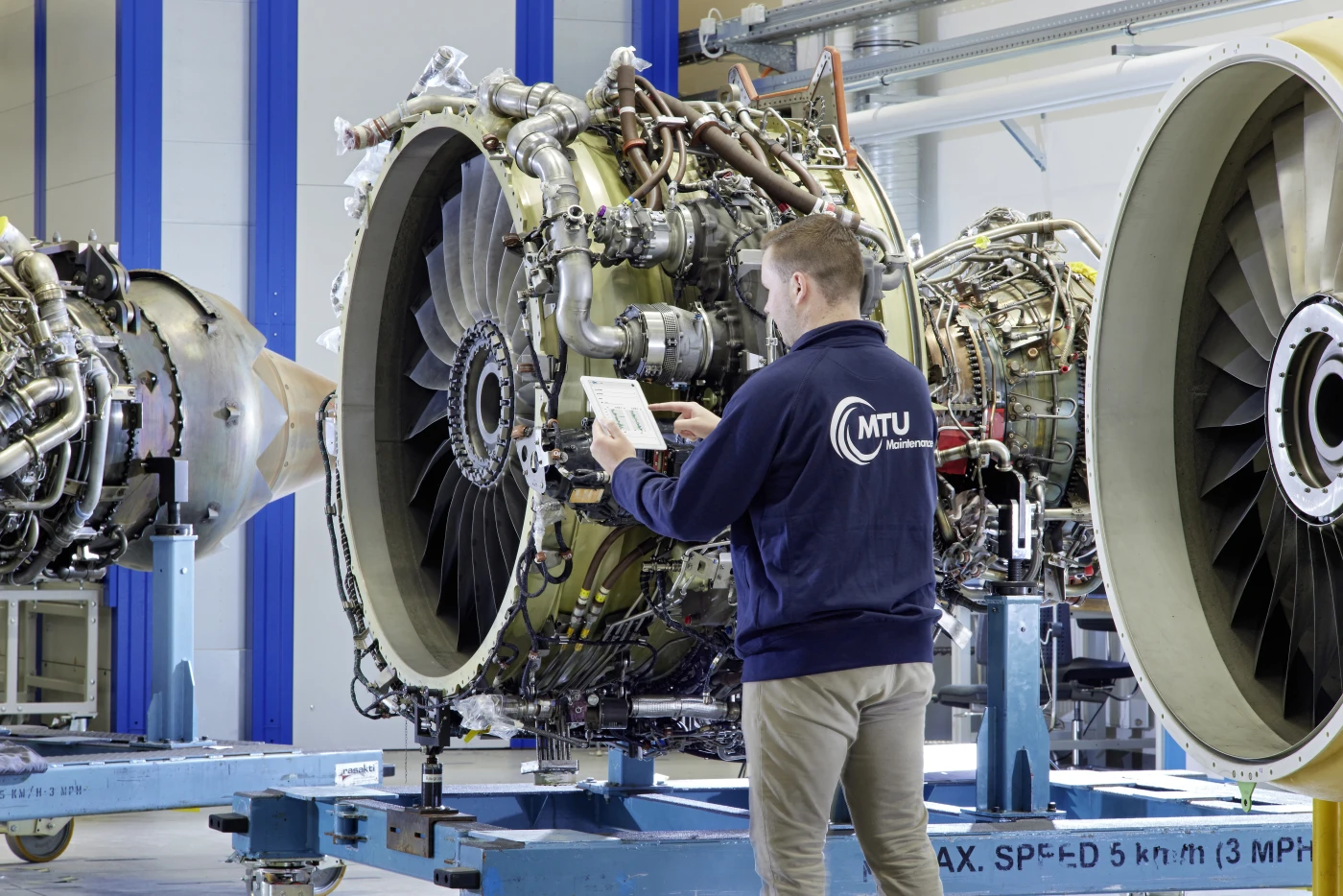
All-round services: MTU Maintenance has extensive know-how and experience in engine maintenance. This is a particular advantage in the extreme climatic conditions prevailing in Dubai.
Repair solutions for “hot and sandy”
MTU has a long history of satisfied customers in the Middle East thanks to its customized service solutions. Wear and tear is the key issue here, as Ben-Kraiem explains: “Our customers’ engines have comparatively high maintenance needs, because the climate conditions are two things above all else: hot and sandy.” This means that these engines have to undergo a shop visit every two to three years on average, whereas engines that fly in milder climates generally need to be brought to the shop once every six years. “The MRO experts at MTU Maintenance are able to optimize repairs for components such that they can better withstand the challenging climate conditions and have a longer service life, in turn keeping engines on the wing for longer.”
Moreover, flying is indispensable for the region and the people who live there and is often the only option for business and leisure travel. Khan and Neumann notice that fleet structures have changed as a result of the pandemic. Widebody aircraft and long-haul jets still tend to be on the ground due to lower passenger numbers. Meanwhile, short- and medium-haul aircraft have been the first to get back up in the air.
For their next business appointment, however, Neumann and Khan do not need to board a flight. It is just a short drive to the Dubai Airshow 2021—where MTU will be exhibting—to meet their customers and partners.
First international airshow since the pandemic is a complete success
From 14th-18th November, 120,000 visitors graced the halls next to Al Mak-toum International Airport in South Dubai. It was the first international industry meet-up since the Corona pandemic rocked the aviation world. “It was the best Dubai Airshow I’ve experienced so far,” summarizes Michael Schreyögg, Chief Program Officer of MTU Aero Engines. “As the first of its kind in years, it was extremely busy and it was the right decision for MTU to be there.”
One of the show highlights was the public debut of the Boeing 777X, powered by GE9X engines for which MTU has developed and manufactured the turbine centre frame. The 777-9 variant that took to the skies during the aerial displays can carry 426 passengers for 13,500 kilometers. And each GE9X engine can produce up to 134,000 pounds of thrust.
The Dubai Airshow saw 408 orders for Airbus, of which 269 were firm orders and 139 commitments. In many cases, the engine type was not announced, though MTU should indirectly benefit from the two A400M orders from the Indonesian Ministry of Defence as well as the 35 A220 orders from Air Lease Corporation and Ibom Air. The largest Airbus order was a 255 aircraft order from the Indigo Partners. The aircraft are to be split among the group’s subsidiary airlines: Wizz Air (75 A321neo plus 27 A321XLR), Frontier (91 A321neo), Volaris (39 A321neo) and Jet Smart (21 A321neo plus two A321XLR). Boeing did not fare quite as well, announcing an overall total of 97 orders, 72 of which for the 737 Max and 20 were for freighter conversions. For its part, Embraer announced a three E175 aircraft order from Nigerian Overland airways.



